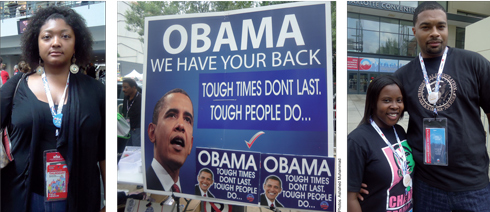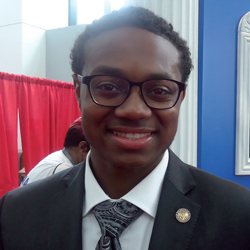Motivated and concerned, delegates rally around president
By Ashahed M. Muhammad -Asst. Editor- | Last updated: Sep 12, 2012 - 10:31:04 PMWhat's your opinion on this article?

(L) Latina Obama supporter Kiara Pesante, from Washington, D.C. (C) One of the many posters expressing support for Pres. Obama, seen during the 2012 DNC. (R) DNC attendees Ashlye Rumph, 29, and Kobie Wilkerson, 35, are engaged to be married. They traveled from Columbia, S.C. Photos: Ashahed Muhammad
|
CHARLOTTE, N.C. (FinalCall.com) - The historic election of Barack Obama in 2008 galvanized and energized voters unlike any other presidential campaign in America’s history.
After a well-scripted and by all accounts successful three-day convention, the Obama campaign wants to keep the energy and enthusiasm high.
In an e-mail to supporters, First Lady Michelle Obama, a major asset to her husband’s campaign, wrote:
“Barack and I felt your energy up there. But we can’t let that energy fade—because in just 60 days, voters will decide who gets to serve in the White House for the next four years. So every single one of us has got to pull together to finish strong.”
Buoyed by presidential approval ratings reaching the highest levels since the killing of Osama bin Laden, President Obama immediately traveled to Iowa and Florida targeting voters and has been campaigning nonstop.
Democratic Party diehards came to Charlotte from near and far to declare their support for the president. Rep. Danny Davis (D-Ill.), who turned 71 on Sept. 6, told The Final Call concerns about the impact of a perceived lack of enthusiasm this election have been fueled by the media. The convention, however, will provide the energy and reassurance needed to allay those fears, he said.
“The first time a person gets married, they’re more enthusiastic than they are the second time, the first time people have sex, they’re more excited about it than they are 20 years later, so there is a first time that you can’t eradicate, there’s nothing that takes the place of the first time,” said Rep. Davis. “I think we are going to see a new level of motivation and engagement on the part of young people from now through November. No, it won’t necessarily be the same as it was four years ago, but I think it is going to be sufficient,” Rep. Davis added.
“Being in the arena and around all of the delegates here for the convention, there is a sense of enthusiasm, I think the energy right now just needs to be channeled,” said 31-year-old Sophia Smith from Maryland and a graduate of Morgan State University.

Brandon Hill, 19, from Minneapolis, MN.
|
“I came because I wanted to be sure as a young person, an educated person, a woman, and a Latina, that I am playing a part in organizing and mobilizing other people in the country and educating them on the truth,” Ms. Pesante told The Final Call.
In the 2008 election, Mr. Obama clobbered his Republican opponent John McCain by over 30 percent among voters under 30, and looks to do the same against Republican challenger Mitt Romney. But a recent Gallup survey found only 58 percent of registered voters between the ages of 18 and 29 said they’ll “definitely vote” this fall, 20 points below the percentage of young voters answering the same question prior to the 2008 election.
During her Sept. 6 remarks at the convention actress Scarlett Johansson, 27, spoke directly to young voters, noting that in the last election, less than half of all eligible voters between 18 and 24 actually cast ballots.
“Young America, why are we only speaking with half our voice when so many issues at stake here directly affect us?” Ms. Johansson asked.
Brandon Hill, from Minneapolis, was 15-years-old when he watched Barack Obama’s ascension to the presidency. He said it changed his life. He was inspired to strengthen his work ethic, his grades improved and he became more goal-oriented. Now, 19-years-old, he is headed to Stanford University majoring in public policy and works as an intern at the U.S. House of Representatives.
“At the time, I didn’t really realize the grand significance of the whole thing,” said Mr. Hill. “I did know that as a 15-year-old Black boy, and a freshman in high school, that it was a very personally inspirational moment for me. It was empowering, it was enfranchising.”
“To watch him win the presidency was an empowering moment for me and let me know my potential too was limitless,” said Mr. Hill adding that although Black youth are still more likely to get their information from BET’s 106 and Park than The New York Times, he believes their political awareness has been raised.
“I think Obama has had a grand impact on the American landscape, especially for young people and people of color, traditionally disenfranchised and oppressed people, and we have a great four years to look forward to,” he said.
Kristopher Nicholas, 19, was born in Trinidad and Tobago and his family lives in South Florida. He was an undocumented resident of the U.S. until three years ago. He took a 15-hour bus ride to attend the Democratic National Convention, and is missing the first week of classes at Columbia University where he is a sophomore. Though he was a little tired and weary, he was excited to be at the DNC. He said his teacher at a school that was “99 percent Black” made the entire class watch President Obama’s historic inauguration January 20, 2009.
“At that moment politics ceased to be something only on television and became something tangible, physical, in the classroom and that sparked my interest in politics from that point on,” said Mr. Nicholas, also an intern at the U.S. House of Representatives.
Ashlye Rumph, 29, a member of Alpha Kappa Alpha sorority, and Kobie Wilkerson, 35, a member of Omega Psi Phi fraternity, are Ph.D. students at the University of South Carolina with the goal of becoming educators. They are scheduled to get married Sept. 28 and have nearly $100,000 in combined student loan debt. They support President Obama because they believe he has the best plan for the future in areas important to them: student loans, education and the economy.
“We hope there will be a brighter light shed on education and we are also interested in seeing what the economy will do,” said Mr. Wilkerson. “He (Mr. Obama) definitely inherited a big mess so hopefully in another four years; we can actually come up out of that.”
Mr. Wilkerson said in 2008, not a lot was known about Mr. Obama, but now, more is known, and Mr. Obama’s supporters have an important role in mobilizing all of the electorate, including youth and the poor. It must be done in order to avoid a Romney victory, he said.
“That’s where the grassroots committees play a large role, targeting different communities within their areas, grasp and reach ensuring them that they have a voice, they have a place and they need to get involved,” said Ms. Rumph. “Waking up Nov. 7 with him (Mr. Romney) as president would terrify me,” she added.
Ms. Smith agreed. In her opinion, there is “a disconnect, coldness and lack of understanding” displayed by the Republican presidential candidate. In her view, a second term for the president would allow him to function even more effectively.
“I’m looking forward to him continuing the work he has already put in and having it amplified at a much higher level without the limitations of having to run for reelection and having to be careful of what he says. I’m looking forward to seeing what he can do without those limitations,” Ms. Smith added.
Rosa Clemente, the 2008 vice-presidential candidate for the Green Party, is voting for Dr. Jill Stein, the party’s nominee, in this year’s election. She doesn’t think either candidate deals adequately with the issues that concern her or affect the poor and people of color.
“I think whomever wins, we as a community must get back to the basics of grassroots organizing. No matter who is in office from the two corporate parties, most of their polices will do nothing to lift the majority of our people out of poverty. We need to have a very honest conversation about the vote,” said Ms. Clemente.
Ms. Pesante is aware of criticisms that neither political party adequately speaks to the needs of the poor. But, she said, the answer is political engagement.
“I don’t think either party does probably as good of a job as it should, it’s definitely a problem,” she said. “It is a serious problem because they are still human beings and they are still Americans and they should be afforded the same opportunities as everyone else.”
INSIDE STORIES AND REVIEWS
-
-
About Harriett ... and the Negro Hollywood Road Show
By Rabiah Muhammad, Guest Columnist » Full Story -
Skepticism greets Jay-Z, NFL talk of inspiring change
By Bryan 18X Crawford and Richard B. Muhammad The Final Call Newspaper @TheFinalCall » Full Story -
The painful problem of Black girls and suicide
By Charlene Muhammad -National Correspondent- » Full Story -
Exploitation of Innocence - Report: Perceptions, policies hurting Black girls
By Charlene Muhammad -National Correspondent- » Full Story -
Big Ballin: Big ideas fuel a father’s Big Baller Brand and brash business sense
By Bryan Crawford -Contributing Writer- » Full Story






 Click Here Stay Connected!
Click Here Stay Connected!








